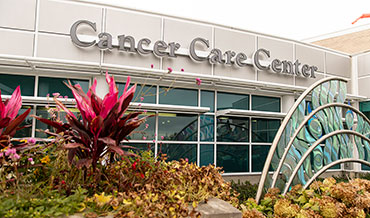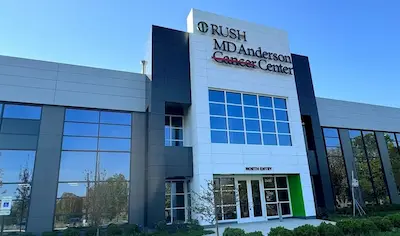The Rush Approach to Gastrointestinal (GI) Cancer Treatment
At Rush, we understand how overwhelming it can be when you’ve been diagnosed with a gastrointestinal (GI) cancer, such as stomach cancer, pancreatic cancer, colon cancer, esophageal cancer or anal cancer. Our experienced, compassionate team of GI cancer experts is dedicated to providing you with the most advanced care, while also making your quality of life our top priority.
Your GI cancer team will help guide you through your entire continuum of care — from diagnosis and treatment through survivorship. A nurse coordinator will work closely with you to coordinate tests, treatments and appointments to ensure that you are receiving the care you need and addressing any concerns you may have along the way.
You may also receive gastrointestinal cancer treatment through The Coleman Foundation Comprehensive Clinic for Gastrointestinal Cancers at Rush University Medical Center, which brings together a team of GI cancer experts. In the clinic, you will meet with your care team — which may include medical oncologists, gastroenterologists, surgical oncologists, colorectal surgeons, interventional radiologists, genetic counselors, dieticians, social work, supportive oncology and others — in a single visit to discuss your diagnosis and GI cancer treatment options. At the end of this meeting, you will have a comprehensive treatment plan tailored to your specific diagnosis and needs.
Nicole's Story

Non-surgical Treatments
Some treatments for GI cancer do not rely on surgery or are used together with surgery. Your GI oncologist will provide you with options based on the type of cancer you have, the stage of the cancer and your individual needs. They will also talk with you about details like possible side effects and what to expect during treatment.
- Chemotherapy: One common non-surgical treatment is chemotherapy or “chemo” for short. Chemo uses drugs to directly kill cancer cells or slow their growth. You may take one chemo drug or a combination, and patients often take these in cycles. At RUSH, you’ll have a comfortable infusion station during treatments with a television and enough space for family or whoever supports you.
- Immunotherapy: Immunotherapy is another form of non-surgical GI cancer treatment. Like chemo, it relies on drugs, but the goal is to help your own immune system fight cancer cells rather than attacking the cancer directly. It can also work in combination with other treatments, including chemo.
- Radiation: Other types of treatment may use radiation to target cancer cells. Some of these treatments use external, focused beams of radiation, while others deliver radiation from inside the body. Peptide receptor radionuclide therapy, or PRRT, is one of these types of treatments that uses an intravenous solution with a small amount of radioactive material to attack the cancer. Brachytherapy is another type of therapy where an internal radiation source is placed near the tumor within the body. It lets your physician deliver radiation in a high, targeted dose to treat the cancer.
Surgical Treatments
Like non-surgical GI cancer care, surgery can be used in combination with other forms of treatment. Your oncologist will discuss your options with you and let you know what to expect.
Surgery may involve removing part or all of an organ to treat tumors. The type of surgery will depend on where the cancer is in the body and how severe it is. If possible, the surgeon will perform the surgery laparoscopically, meaning they will use several small incisions to reduce pain and speed up recovery.
- Esophagectomy: Esophagectomy is the most common surgery for treating esophageal cancer. It involves making an incision in the neck, chest or abdomen to remove some or all of the esophagus and nearby lymph nodes. The surgeon then reconstructs the esophagus using the stomach or intestines.
- Gastrectomy: is another form of surgery where a surgeon removes all or part of the stomach and, possibly, nearby lymph nodes. It is a major operation and will require the patient to make dietary changes after recovery.
- Pancreatectomy: Similarly, a pancreatectomy is the removal of some or all of the pancreas. Upon recovery, patients will likely have to take insulin and digestive enzymes from then on.
- Whipple procedure: For cancer that happens in the head of the pancreas, the Whipple procedure is the most common form of surgical treatment. It involves removing the head of the pancreas, part of the small intestine, the gallbladder, the bile duct and possibly part of the stomach and nearby lymph nodes. While it is a complex and difficult surgery, it is often lifesaving for cancer patients.
Minimally Invasive Treatments
There are a wide range of minimally invasive treatments that can reduce pain and recovery time for GI cancer patients more than traditional surgery. Some involve the placement of stents, or small tubes, that are inserted and inflated to unblock ducts in the GI tract.
These treatments sometimes allow the patient to leave the hospital the same day or a few days after their procedure. Your oncologist will discuss these options with you and whether they will effectively treat your cancer.
- Robotic surgery: Robotic surgery allows a surgeon to make small, precise incisions, reach difficult-to-see areas and avoid damaging nearby healthy tissue while removing cancerous tissue. RUSH was the first hospital in Chicago to use many types of robotic surgeries.
- Endoscopy: Some treatments use an endoscopy, or a small camera through the mouth or anus, to both diagnose and treat GI cancer. Endoscopic retrograde cholangiopancreatography, or ERCP, is one of these procedures that also uses X-rays to examine the liver, gallbladder, bile ducts and pancreas. The physician can slide small tools down the scope to perform minor procedures. Endoscopic mucosal resection, or EMR, is another procedure that relies on an endoscope and can allow a physician to remove tissue for diagnosis or remove precancerous or early stage cancer tissues. Transanal Endoscopic Microsurgery, or TEM, similarly allows a physician to remove noncancerous rectal tumors and early-stage cancers directly through the rectum with minimal recovery time.
Getting a Second Opinion from RUSH MD Anderson Cancer Center
Have you been diagnosed with cancer? Consider a second opinion from RUSH MD Anderson. A second opinion can help you explore all your options and begin treatment with confidence and clarity.
RUSH MD Anderson offers easy access to second opinions, including free virtual intake visits with our knowledgeable nurse navigators for anyone in Illinois.
Rush Excellence in Gastrointestinal (GI) Cancer Treatment
- Leading-edge treatments for GI cancers: As one of the nation's leading academic health systems, Rush offers leading-edge treatments in Chicago and the surrounding areas for GI cancers, including targeted therapies, immunotherapy, chemotherapy, and minimally invasive surgical options. In some cases, your care team may also recommend genomic sequencing to further tailor and personalize your care. And, you'll also have access to clinical trials that are incorporating novel and innovative approaches for treating GI cancers.
- Expertise in treating advanced gastrointestinal cancers: Rush University Medical Center in Chicago is one of the few medical centers in the nation that offers hyperthermic intraperitoneal chemotherapy (HIPEC), a novel and effective treatment for certain patients who have advanced abdominal cancers, and peptide receptor radionuclide therapy (PRRT), a novel therapy for neuroendocrine cancer.
- Center of excellence for pancreatic cancer care: Rush is a designated National Pancreas Foundation Center of Excellence. This designation recognizes Rush's multidisciplinary treatment of pancreatic cancer, treating the whole patient with a focus on the best possible outcomes and improved quality of life. Rush is the first health system in Illinois to earn this designation.
- High-risk clinic for GI cancers: The high-risk gastrointestinal (GI) cancer clinic at Rush University Medical Center in Chicago will work closely with you if you have underlying pre-cancerous conditions or genetic factors that put you at a higher risk for developing GI cancers — including colorectal, esophageal, gastric or pancreatic cancers. Our expert team will provide you with personalized GI cancer risk assessment, screening and preventive care — as well as a care and surveillance plan based on your distinct needs and risk factors.
- Convenient care: With Rush cancer locations in Chicago and throughout the suburbs, we make it convenient for you to get the gastrointestinal cancer treatment you need, where and when you need it. And no matter where you see your GI cancer provider, you can receive gastrointestinal cancer treatment at any of our infusion centers in downtown Chicago, Oak Park, Lisle and Aurora/Fox Valley.













